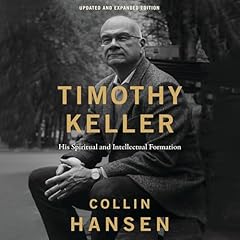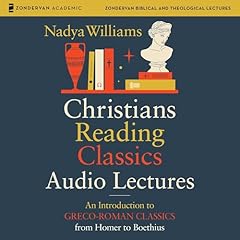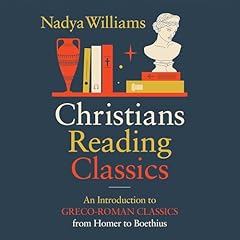
Cultural Christians in the Early Church
A Historical and Practical Introduction to Christians in the Greco-Roman World
No se pudo agregar al carrito
Add to Cart failed.
Error al Agregar a Lista de Deseos.
Error al eliminar de la lista de deseos.
Error al añadir a tu biblioteca
Error al seguir el podcast
Error al dejar de seguir el podcast
 Exclusivo para miembros Prime: ¿Nuevo en Audible? Obtén 2 audiolibros gratis con tu prueba.
Exclusivo para miembros Prime: ¿Nuevo en Audible? Obtén 2 audiolibros gratis con tu prueba.Compra ahora por $26.09
-
Narrado por:
-
Marni Penning
-
De:
-
Nadya Williams
In the middle of the third century CE, one North African bishop wrote a treatise for the women of his church, exhorting them to resist such culturally normalized yet immodest behaviors in their cosmopolitan Roman city as mixed public bathing in the nude, and wearing excessive amounts of jewelry and makeup. The treatise appears even more striking, once we realize that the scandalous virgins to whom it was addressed were single women who had dedicated their virginity to Christ.
Stories like this one challenge the general assumption among Christians today that the earliest Christians were zealous converts who were much more counterculturally devoted to their faith than typical church-goers today. Too often Christians today think of cultural Christianity as a modern concept, and one most likely to occur in areas where Christianity is the majority culture, such as the American "Bible Belt." The story that this book presents, refutes both of these assumptions.
Cultural Christians in the Early Church, which aims to be both historical and practical, argues that cultural Christians were the rule, rather than the exception, in the early church. Using different categories of sins as its organizing principle, the book considers the challenge of culture to the earliest converts to Christianity, as they struggled to live on mission in the Greco-Roman cultural milieu of the Roman Empire. These believers blurred and pushed the boundaries of what it meant to be a saint or sinner from the first to the fifth centuries CE, and their stories provide the opportunity to get to know the regular people in the early churches. At the same time, their stories provide a fresh perspective for considering the difficult timeless questions that stubbornly persist in our own world and churches: when is it a sin to eat or not eat a particular food? Are women inherently more sinful than men? And why is Christian nationalism a problem and, at times, a sin? Ultimately, recognizing that cultural sins were always a part of the story of the church and its people is a message that is both a source of comfort and a call to action in our pursuit of sanctification today.
Los oyentes también disfrutaron:




















Las personas que vieron esto también vieron:







Very insightful and masterfully told
Se ha producido un error. Vuelve a intentarlo dentro de unos minutos.
One of the ongoing discussions within the guild of historians (which I have observed from the outside since I have no academic training in history) is the role and method of writing history for contemporary use. Some believe that historians have an obligation to educate and draw connections between history and current events. Some historians go beyond that and become activists in their writing and historical work. Some historians believe that a historian’s work should only involve history rather than connect that history to modern events or culture. (There is way more nuance and range of positions than this brief sketch can accurately represent.)
Cultural Christians in the Early Church is an unusual book by a historian. First, Nadya Williams is actively trying to draw spiritual connections from her historical work that can be used today. This is not activism, but it is more than what many historians are willing to do. As a non-historian who reads history explicitly because it is an integral part of understanding our current events and because I am a spiritual director interested in Christian formation, this book is right up my alley. Second, Williams is not only a good writer who keeps the reader engaged, she is also funny. Many academic writers attempt to be funny but are limited to bad Dad jokes. Cultural Christians in the Early Church has a lot of subtle but engaged humor.
One of the strengths of the book is that she has a pattern. Williams identifies and gives context about Roman cultural values. Then she gives an example of a Christian leader who understood the problem of the Christian value (for instance, Cyprian encouraging Christians to give to the poor for the sake of the poor and not just for the glory it would show to the giver). Then, she talks about the evidence that many of the Christians of the era did not live up to the Christian ideals that were present at the time and instead followed the Roman cultural ideals, not the Christian ones that they were called to. A reflection follows this up on how that subject area of cultural Christianity in the early church parallels the modern US church. That sounds more formulaic than it is in practice. There is subtlety and variation in presentation, but those components are present in almost every chapter.
The idea of cultural Christianity does shift a bit, and I am not sure I would identify cultural Christianity in the same ways. For instance, identifying that Romans went on tours of religious sites before Christianity and then Christians also went on tours of religious sites as Christians does tell us something about how Christians adapted their cultural values, but it is a different understanding of cultural Christianity than Christians not being willing to give to the poor or not seeing a problem with going to prostitutes. Culture shapes us. We cannot be Christians apart from culture because we can never entirely leave the reality of cultural influence. We can still work to become aware of how culture influences us. And it does not mean we cannot challenge culture (as many of the examples in the book show.) But it does mean that not all cultural adaptations influenced by culture oppose Christianity. (For instance, the styles of music that Christians sing are often culturally derived, and being able to sing in a culturally relevant mode is good.) The reality is that the ways that culture influences Christians are varied. While I think there are differences in how she uses the idea of cultural Christianity throughout the book, she points out essential aspects of how culture influences our practices of Christianity with the lens of the early church, which is very helpful.
The conclusion and its reflection on the “so what” of the previous chapters is helpful. Her status as an immigrant (coming to the US in high school) gives her a helpful status to be a part of the American Christian culture but also have a distance, which helps to see issues of cultural Christianity with different eyes from those that have not had cross-culture experience or spent time studying. I think that areas where I disagree with some of her framing of cultural Christianity are very likely the result of my blindspots around how I, as a Christian, relate to culture.
I am a part of an ongoing book discussion group. The previous book before the one we are working through right now was Misreading Scripture with Western Eyes. While these two books’ approaches are very different, they have complementary results of challenging the reader to introspectively look at our assumptions about Christianity and culture in ways that we may not have thought to inspect because we have not previously thought about the connections in those ways. This book would make for an excellent small group discussion because it challenges the reader and how different readers will be challenged differently, leading to a fruitful discussion.
helpful and surprisingly funny
Se ha producido un error. Vuelve a intentarlo dentro de unos minutos.


